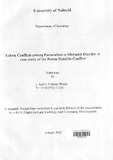| dc.description.abstract | Violent conflicts involving pastoralists have become widespread and increasingly severe in the Northern Kenya. This study identities and examines the the factors contributing to such conflicts, and
discusses issues and priorities for conflict prevention and peace building. On the basis of this examination, a number of conclusions and recommendations are proposed on ways in which the stakeholders could contribute to the concerted efforts of curbing violent conflicts involving pastoralists in Kenya.
Conflicts involving pastoralists associated with resource competition, cattle rustling and wide availability of small arms are widespread and of increasing concern. This study of the Boran-Rendille conflict provides a useful case to examine in depth factors contributing to pastoral conflict and priorities for conflict prevention. The study highlights several consequences of the Boran-Rendille conflict, which has had a negative impact on the communities under focus.
A total of 1050 people have been displaced by the Boran-Rendille conflict in Marsabit District. 70% or 735 of the displaced are women and children aged below 14 years. In addition to displacements, many women have also been widowed by the conflicts further increasing their vulnerabilities to poverty and human right abuses.
The study also found out that Marsabit district is among the ten poorest districts in Kenya in all the development indices. School enrolment rates are far below the national average, majority of the people in the district depend on relief food and are malnourished. Mortality rate is high and so are poverty levels. Water and sanitary services are inaccessible to the majority of the pastoralists.
Rights of the displaced people have been grossly violated as the study found out that there is a strong correlation between displacements and increased rape cases, physical assaults, prostitution, growing
number of street urchins and child labour.
Efforts to prevent and mitigate violent conflict involving pastoralists in the district need to address each of the factors contributing to conflict as outlined above. | en_US |

